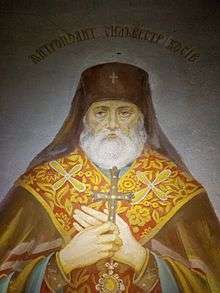Sylvester Kosiv
Sylvester Kossów, Kosiv or Kosov (secular name Stefan-Adam Kosaw, Polish: Sylwester Kossów; born Zharobychi, Vitebsk Voivodeship, Polish–Lithuanian Commonwealth, died 13 April 1657) was a Ruthenian Orthodox metropolitan of the Polish–Lithuanian Commonwealth and Polish-Ruthenian writer. He served as metropolitan of Kiev, Galicia and all Ruthenia (1647–1657) during the Khmelnytsky uprising. His official title was Metropolitan of Kiev, Galicia and All-Ruthenia.
Sylvester Kossów | |
|---|---|
 | |
| Native name | Silvester Kosaw |
| Church | Ruthenian Orthodox |
| Metropolis | Kiev Metropolis |
| See | Ecumenical Patriarchate of Constantinople |
| Elected | 1647 |
| In office | 1647–1657 |
| Predecessor | Peter Mogila |
| Successor | Dionysius Balaban |
| Other posts | Bishop of Mstsislaw, Orsha, and Mahiliow (1635-1647) |
| Personal details | |
| Birth name | Stefan-Adam Kosaw |
| Born | Zharobychi, Vitebsk Voivodeship, Polish–Lithuanian Commonwealth |
| Died | 13 April 1657 Kiev, Cossack Hetmanate |
| Buried | Dormition Cathedral (Kiev Pechersk Lavra) |
| Denomination | Ruthenian Orthodox |
| Alma mater | Zamość Academy |
Education
Kossów was a descendant of a Ruthenian noble family. He studied at the Kiev and Vilno Brotherhood schools and at the Lublin Jesuit Collegium and Zamość Academy before beginning to teach at the Vilno and Lviv Dormition brotherhood schools. After finishing his education, Kosiv accepted monastic vows at the Saint Trinity Monastery in Vilno. With the opening of the Kiev Lavra School in 1631, Kosiv be its lecturer on the request of Metropolitan Petro Mohyla becoming its prefect. In 1632-1635 he was the first prefect at the Kiev Collegium teaching courses on rhetoric and philosophy. At the same time in 1632 Kosiv joined the Kiev Epiphany Brotherhood.
Bishop Sylvestr
In 1635 he became bishop of Mstislavl, Orsha, and Mahiliow. Following the Union of Brest, the eparchy of Mstislawl, Orsha, and Mahiliow became the only Eastern Orthodox eparchy within the Grand Duchy of Lithuania. In 1647 he became the metropolitan of Kiev. It happened just before the Khmelnytsky Uprising, a time of uncertainty in Ukraine and in the Ruthenian church.
Kossów himself was strongly opposed to union with Tsardom of Russia, and also against unreserved alliance with Poland. He condemned the 1654 treaty of Pereyaslav between the Cossack Hetmanate and the Tsardom of Muscovy. Despite being critical of some of the policies of the Ukrainian Cossacks, he attempted to rectify the situation and along with the Patriarch of Jerusalem Paiseus gave Bohdan Khmelnytsky a hero's welcome when he entered Kiev in 2 January 1649 (Old Style 23 December 1648). Kossów strived for an independent Ruthenian Orthodox Church that would be only under the jurisdiction of the Patriarch of Constantinople, and he fought against the subjugation of the Kiev metropolate to Moscow.
In 1650 Sylvestr headed a delegation of the Orthodox clergy and Kiev voivode Adam Kysil to the Sejm in Warsaw and contribute to ratification of the 1649 treaty of Zboriv.
Bibliography
- (in Polish) "Exegesis, to iest dawne sprave o szkolach Кiowskich i Winickich" (English: Exegesis, is the old issue on schools of Kiev and Vinnytsia, 1635) – about the Kiev Collegium, its program, advantages of studies in Latin and Liberal Arts (so called "septim artes liberalis", Seven Liberal Arts)
- (in Polish) "Paterikon, abo Żywoty ss. ojców pieczarskich" (English: Patericon or the Life of Saint Fathers of [Kiev] Caves, 1635) – shortened version of the Kiev Caves Patericon that included list of Metropolitans from Michael (994–998) to Peter Mogila
- (in Belarusian) "Дидаскалія, альбо наука о седми сакраментах, альбо таїнах" (English: Didascaliae, or a science about the seven sacraments, 1637)
See also
- Kuteino Epiphany Monastery (Epiphany Cathedral)
External links
- Sylvestr Kosov at the Encyclopedia of History of Ukraine
- Sylvestr Kosiv at the Encyclopedia of Ukraine
- Andrew Wilson. The Ukrainians: Unexpected Nation. Yale University Press, 2002. p 60.
| Preceded by Peter Mogila |
Metropolitan of Kiev, Galicia and All-Ruthenia 1647–1657 |
Succeeded by Dionysius Balaban |
| Preceded by Iosif Bobrikovich |
Bishop of Belarus 1635–1647 |
Succeeded by Iosif Kononovich-Horbacki |